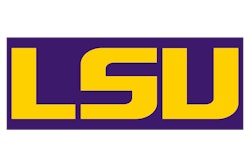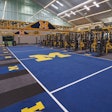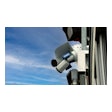All Rights Reserved
When you're a 20-something who owns your own company, standing in line at the bank isn't the chore that most people dread. In fact, it has become a sort of entertainment for the founders of VirtualU, a local startup on the brink of launching its body scanning technology.
Louis Cirillo, one of the company's co-founders, tells the story of when he asked the woman behind the counter if there's a limit on how much money he can transfer from one account to another. The teller said he shouldn't worry since he won't be moving more than $20,000.
He looked at her blankly.
"Certainly not $100,000?"
He raised his eyebrows.
"I'll get the manager."
"They always look at us like, 'We don't know where this money is coming from and these kids are like 22 years old,'" co-founder Caroline Pugh said. "I think a lot of people in the mainstream world who aren't techies don't understand that it's totally possible as a student now to start a company."
Each of VirtualU's three founders were undergrads at Virginia Tech when they hatched the idea for a scanner that creates 3D models of your body. They're calling their invention VFit.
Think dressing room outfitted with cameras and lasers. You step in, the machine does its magic and spits out a 3D representation that is accurate down to about a millimeter. You could use the model to determine if your workout routine is doing the trick or if that shirt you're buying online will fit when it shows up in the mail.
Others have tried and failed to come up with a machine that can do this, but the VirtualU team decided to give it a crack in 2011.
They started working on proof of concept designs that year, found investors early in 2012 and pretty quickly committed themselves to the company fulltime.
"By fall semester, I didn't go back to class," Cirillo said. "Neither did ... anybody really."
At 24, Cirillo is the oldest on the VirtualU team. He's the CEO, but the company hierarchy right now can have more to do with who sits closer to the office music controls than anything else. A grand total of seven people work for VirtualU, and none of them have celebrated their 30th birthday yet.
The office sits inside the Virginia Tech Corporate Research Center, with hardwood floors and playful green walls.
It's the kind of place where windows double as white boards and each is covered with some kind of inside joke or a math formula that may be the secret sauce behind the company's futuristic technology.
The floor is littered with pieces of prototypes past and tape that marks the footprint of the next version already in the works.
But don't let the Nerf darts fool you: the office is home to serious technology that has caught the eye of some of the region's heavy-hitter investors.
While the team joked around inside on Wednesday, Cirillo sneaked into the hallway, sat on the floor and took a phone call about $100,000 investment deals VirtualU is hatching. It's moments like these when you realize this is no science fair project. These 20-somethings could be creating an entirely new 3D imaging industry.
VirtualU didn't want to disclose exactly how much it has raised from investors so far, but it expects to release that sometime next month. Most of the support has come from Virginia Tech alumni, and they're almost all locals.
Investor Mark Lucas, the first franchisee of the Five Guys restaurant chain in 2004, has since become a serial entrepreneur in the region. He says he's bought into VFit.
"Sometimes you get a good feel," he said.
VirtualU has used the money to pay their employees' salaries, but they promise it's hardly more than what they were living on when they were Tech students.
As they start to manufacture their designs and hope to roll out their first finished products in February, they'll need even more capital. They say they already have interested investors. The team has built six iterations of VFit, but it's the new, professionally manufactured one that has the team excited.
They don't shy away from a chance to show off their brainchild. It's not perfect yet, they say. But after all the late nights, it's a good start. Version 2.0 will be a little slimmer, more sophisticated and packed with features.
VirtualU plans to one day expand to several industries, but for now they want to see their scanners sitting in gyms across the country.
The first version won't have all the features they hope to one day boast, but it will be an entirely new experience for everyone who steps inside.
The scanner is an 8-foot-tall booth that takes up about 5-by-5-feet on the floor. A lot of what makes it tick lies below the surface. The team was willing to explain most of the processes, but withheld information about the parts that would make it easy for copycats to swoop in.
Each corner of the booth is outfitted with several cameras and a laser.
When you start the scan, the cameras move down the length of your body in about 10 seconds, taking some 3,600 photos along the way. From the pictures, VirtualU's software extracts 12 million "data points," or the location of dots spread out about 1 millimeter apart all over your body.
The data points are sent to VirtualU's off-site computers, which plot them along 3D axes, essentially creating a cloud of dots that outline your body. Software then turns these dots into a "photo-realistic" model of your body.
But for the users, that's all behind the scenes.
All they have to do is step in the box, sign into their account, spread their arms and wait for the scanner to capture their body.
A few minutes later, once computers finish generating the model, they can log in online or on their iPhone to see how they look.
The first version of the scanner will give you the model and measure things like weight, height, body mass and volume and body fat percentage.
One day, the team says it plans to develop software that compares one scan to another. The machine will be able to tell users the size of their biceps and if they have grown by even 1 millimeter since the last time they stepped inside.
The VirtualU team also hopes other industries will find the scanners useful. For instance, retail stores could eventually let you try on virtual clothes when you shop online, and video game creators could make your own avatar a character in games.
But first, VirtualU has to get its VFit device market ready.
Other than a few tweaks, most of the VFit scanner hardware is complete. They're able to collect all the data points and now just need to finish the software that turns them into the 3D image.
Nick Graber, one of their engineers, says they're making progress, but it's not ready to be shown off just yet. Give them a couple more weeks, though, and he expects to have everything calibrated properly.
Southwest Virginia will be the first to see what VFit can do, as VirtualU has selected five local gyms that will get the scanners for free for beta testing. They'll start going out in February, although the timetable is subject to change.
The first five gyms are Anytime Fitness and the Weight Club in Blacksburg, McComas Hall on Virginia Tech's campus, Foley Health and Fitness Training in Christiansburg and Fit Studio 365 in Roanoke.
The company has been in communication with gyms in Washington, D.C., and New York City that are interested in becoming the first paying customers.
The VirtualU team says it will experiment with payment structures during the test period, but said the plan is to keep ownership of the machines and lease them to gyms. It should cost about as much as gyms are used to paying for other pieces of workout equipment, according to the company.
In the meantime, Pugh said she's still working to convince people like her dentist that VirtualU is more than a school project.
Adam Rossi, a Roanoke local who has invested in the company, said he never had a hard time believing in the VirtualU founders.
When he founded his software company, Platinum Solutions, he was 24 years old and plagued by an even more youthful appearance. When he was 30, Rossi said, he was once carded when he tried to see an R-rated movie.
He remembers being overlooked in his own board meetings, as people would assume his co-workers with more gray hairs were running the show.
Nonetheless, he was able to build his company into an empire, selling it in 2010 for $90 million, based on media reports at the time.
In an age where a coder with a laptop and crazy idea can launch the next Facebook overnight, he said this is the new norm in the technology industry.
"I think if you have a good idea now, the barriers are down lower than they've ever been in the past," Rossi said. "Good ideas rise to the top and it's not so much a dues-paying type of business world that we used to have."
The fate of VirtualU is still very much up in the air, but that's the nature of startup companies. The team plans to try something. If it fails, they'll fix it and go again.
The founders recently sat down to plan for the rest of 2014. They got through about seven months and then had to admit they have no idea where the company will be by then.
Hit it big, and they're the most recent 20-somethings to ride the tech wave.
If the VFit doesn't work as they expect, they're back to the drawing board.
"You kind of stick your head up in the clouds every once in a while just to try to think what it would be like," Graber said. "But then you're like, 'If I want that to happen, I better get back to work.'" \
VFit technology
When you start the scan, the cameras move down the length of your body in about 10 seconds , taking some 3,600 photos along the way. From the pictures, VirtualU's software extracts 12 million "data points", or the location of dots spread out about 1 millimeter apart all over your body.
Terms and Conditions Privacy Policy































